The Place I Dream Of
STORY BY MAHMOOD FAZAL, PHOTOS BY CHRIS TURNER
Tammi Jonas was raised on a cattle ranch in Oregon, the nostalgia still captures her today.
“It's still the place that I dream of with its saturated greens and its big, wide rivers. It's a very beautiful place,” says Tammi. “I don't want to ever live there again. But Oregon is very dear to my heart. I left because I was worried about the politics back in 1991 when the first gulf war was on. They’ve only got far worse.”
While travelling across Europe in her youth, Tammi met her partner Stuart backpacking in London. She says, “You think you’re just going to have a backpacker boyfriend but it turns out you’ve met the love of your life.”
While walking along a cliff face in Wales, they began to talk about what they wanted to do with their lives. “I said, ‘I want a farm. It will be in Boulder, Colorado - it’s a really progressive area.’ I was a vegetarian but I was going to have all the animals. And artists, musicians and the like will want to come and be there.” Stuart turned around and confessed to Tammi, “I can’t really see you being a farmer.” As she laughs, “I had this vision for what Jonai is. It was unclear. But I had this vision for it.”
The Jonai (aka Tammi, Stuart, Oscar, Antigone & Atticus Jonas) eventually settled on 69 acres at Eganstown on Dja Dja Warrung country, just outside the beautiful town of Daylesford, to raise heritage-breed Large Black pigs on pasture.
Tammi quips, “The first big challenge was just the basic lack of farming skills. Like, how do you build a fence? Those challenges were funny, because it was just like the minutiae of what you hadn’t thought about that you were going to need to do.”
There were major butchery hurdles to overcome too. She says, “we discovered that nobody was very interested in cutting for us regularly and if they did it was going to be expensive. Very quickly we decided we were going to build a boning room.”
Eventually, Tammi began working with a regional butcher in Ballan named Salvatore Fusca to learn the craft of butchering a pig. But the essence of what Jonai Farms was embarking on was about how we should be living, “the research is really clear that peasants and Indigenous peoples are the best custodians of biodiversity and maintaining a sustainable resource base, and they've done it for millennia. And industrial society is so separated from that, that they really need to look back to the small holders and the Indigenous peoples for guidance.”
Tammi adds, “Capitalism colonises, it exploits and it abandons. Peasants of the world don't typically leave their patch of land, they stay and they have to care for it.”
The core of her ethos is about the way we frame our lives in accordance with nature, “It’s about living in harmony with nature and having reverence for what nature provides, and knowing that we're part of it instead of separate.”
This month, Tammi has launched a crowdfunding campaign for a micro abattoir at Jonai farm - a demand that was exacerbated during the pandemic and a project Tammi has been working on for years. “[Abattoirs] should be really small. There should be human-animal interactions in those spaces as opposed to entirely automated [processes],” says Tammi.
At the moment, Jonai Farm butcher along with seven other farms, plus several more, are interested in collaborating if the abattoir is built.
“Rebuilding regional abattoirs for smaller number of smallholders is critical to maintaining food security for ethical and ecologically sound food. Sure, you might be able to still get industrial meat through industrial processes, but eventually small holders will have nowhere to go.” Tammi warns, “We're constantly at risk of losing access to abattoirs as has already happened to smallholders all over the country.”
Tammi believes the best way for the community to preserve their ideals is by practicing a commitment to community in the economics. “We’re building an abattoir without anybody going into debt to do that, pooling community resources rather than getting it from capitalist shareholder operations,” explains Tammi. “That's how communities will take control of the food system back. It's by everyone putting in a little bit so that we can all maintain control locally or regain control locally.”
If you would like to support the Abattoir you can contact Jonai Farms on their website.
Jonai Farm
0422 429 362
www.jonaifarms.com.au
129 Morgantis Road, Eganstown

